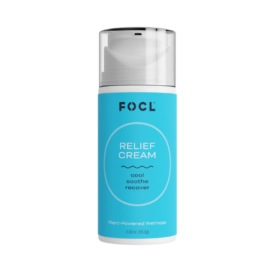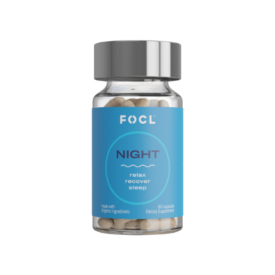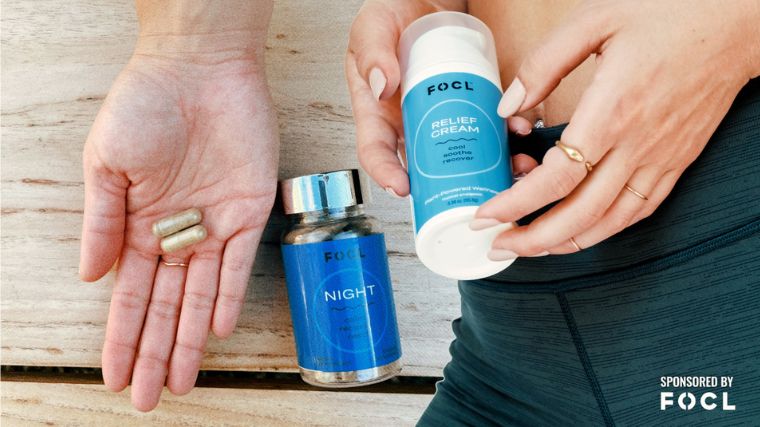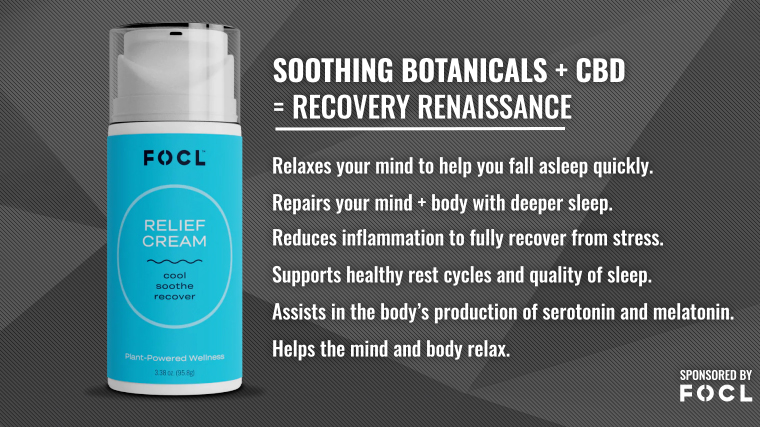You often know the second it happens — there’s a tell-tale pinching or popping sensation as the muscle is pushed past its limit. And then the pain, swelling, and stiffness start to set in. Suddenly, all the training sessions on the schedule are out, and you have to shift your focus to rest. Frustrating doesn’t begin to cut it.
While muscle strains are guaranteed to set back your goals for some amount of time, there are ways to speed up the process of muscle healing and recovery. We dug into the research and looked at the science-backed strategies that can help you retain your gains and support muscle repair so you can get back to training faster.
Editor’s note: The content on BarBend is meant to be informative in nature, but it shouldn’t take the place of advice and/or supervision from a medical professional. The opinions and articles on this site are not intended for use as diagnosis, prevention, and/or treatment of health problems. Speak with your physician if you have any concerns.
What Are Muscle Strains?
Muscle strains — an injury that results from a muscle being stretched or extended too far or contracted too forcefully — are common.
Anytime you’re pushing your body to the max, there’s the possibility of straining a muscle. This type of injury is especially common among athletes. Muscle strains can also occur if tired or sore muscles become overworked or when muscles are over-extended or forced to contract too strongly during daily activities like lifting a heavy box or unloading groceries from the car. (1)
A muscle strain can range in severity from mild to a full rupture. Mild to moderate strains often involve similar symptoms (including soreness, stiffness, and reduced strength in the affected area) to delayed-onset muscle soreness (DOMS) that is common after starting a new workout regimen or a particularly strenuous training session. But the pain from a muscle strain tends to be more localized and intense. Most mild to moderate muscle strains will heal on their own within 48 hours to a few weeks. (2)
In more severe cases, the muscle may tear all the way through or be severed from its tendon. These strains (called class III strains) can cause complete loss of muscle function as well as extreme pain, swelling, and bruising or discoloration. Severe strains may require surgery to repair.
If you suspect your muscle strain is severe or your symptoms haven’t improved within two weeks, be sure to see your health care provider or physical therapist for a diagnosis and rehabilitation plan to ensure the muscle can heal properly.
6 Ways to Help Muscle Strain Recovery
No matter how severe your muscle strain is, there are strategies you can use to support muscle repair, reduce pain and soreness, and fast-track healing. Just as taking a day off is essential to promoting recovery after resistance training sessions, resting the strained muscle is the most important thing you can do to give the muscle time to repair itself. Other smart strategies include incorporating active recovery workouts to stimulate blood flow and reduce swelling and eating a nutritious diet that supplies muscles with the fuel necessary to rebuild tissue.
Read on for a more in-depth look at some science-backed ways to speed up recovery from a muscle strain.
Find Ways to Relax
Mental stress can sabotage your muscles’ ability to recover from an injury, according to a recent study from the Yale Stress Center.
Researchers had students complete a psychological test measuring stress levels before doing a bout of strenuous resistance exercise, then looked at markers of recovery over a four-day period. In every metric, higher stress levels were associated with worse recovery. (7) Scientists believe that cortisol and other stress hormones promote cellular inflammation, which can slow healing and the recovery of muscle function.
To get a handle on mental stress, try practicing mindful meditation or deep breathing. Or take up some relaxing activities, like soaking in a warm bath, spending time with loved ones, or playing with your pet.
If you need extra help finding time to relax, try cannabidiol (CBD). This cannabinoid, found in cannabis and hemp plants, can reduce stress in your mind and body.
CBD interacts with your endocannabinoid system, a part of the central nervous system that regulates things like mood, sleep, and appetite. Either by itself or mixed into your favorite beverage, CBD is the ultimate all-natural way to find calm. (12)
Massage Your Way to Relief
Muscle strains can leave you sore, stiff, and achy, but there are ways to get relief: Over-the-counter pain medications — such as non-steroidal anti-inflammatory medications like aspirin or Advil — and topical pain relievers can offer some temporary relief and help reduce swelling.
Foam rolling and other sports massage techniques can also be beneficial. The external physical stimulation works to relax muscles, reduce inflammation, and break up scar tissues, which can dial down pain. Plus, massage increases the flow of healing oxygen to the affected area, helping to promote recovery.
One meta-analysis of 99 studies looking at recovery methods found that massage was one of the most effective techniques for reducing inflammatory markers and recovering from delayed-onset muscle soreness. (8)

Feeling sore? This cream contains 500mg of CBD, botanicals, and menthol to create a soothing effect for your muscles.
Prioritize Sleep
When you are fast asleep, the body pumps out important hormones involved in muscle building and repair, including human growth hormone, insulin-like growth factor 1 (IG-1), and testosterone. Short yourself on zzz’s and you also miss out on the recovery-promoting benefits of these hormones. (9)
Sleep deprivation may slow your recovery. One study found that people who didn’t get sufficient sleep at night had higher levels of inflammation and decreased levels of protein synthesis (a process key to muscle repair) — factors that can lead to the loss of lean muscle mass. (10) Aim to get at least eight hours of quality sleep each night to support your recovery.
Hint: For even faster recovery, consider snacking on a protein-rich bite (like a whey protein shake or hard-boiled egg) shortly before bed. A study found that subjects who consumed about 28 grams of protein before going to sleep saw significantly greater muscle mass and strength gains over 12 weeks than those who skipped the bedtime snack. (11)

Rest easy after taking a single serving of this formula made up of premium hemp CBD + five botanicals — including passion flower, hops cones, and ashwagandha.
Consume the Right Fuel for Repair
Eating enough calories — specifically, the right amount of protein — is critical to providing your muscles with the raw materials they need to rebuild muscle tissue. That’s because muscles are primarily made up of protein and use the amino acids found in protein-rich foods (such as chicken breast, steak, a scoop of protein powder, tofu, and eggs) to repair damaged tissue.
How much protein you need is dependent on your activity level and your size. Research suggests aiming for about two to two and a half grams of protein per kilogram of body weight per day to optimally maintain muscle mass while physical activity is reduced. (4)
Also smart: Filling your plate with antioxidant-rich fruits and vegetables can help combat inflammation, which may help reduce pain and swelling. Produce that is rich in the red and purple plant pigments called anthocyanins (including berries, cherries, grapes, red cabbage, and beets) have been shown to be especially effective for reducing muscle soreness. (5)
Incorporate Active Recovery
Strenuous workouts are out while your muscle strain is healing, but that doesn’t mean you should stop moving completely. Lower-intensity workouts, like walking, yoga, and stretching, help to stimulate blood flow and flush out lactic acid buildup — two factors that contribute to muscle soreness.
Early return to low-impact activity also promotes muscle repair and regeneration and helps restore the flexibility and strength of the injured muscle. This can help you maintain your strength and protect against additional injury when you do get back to training. (6)
Visualize Your Recovery
Resting a strained muscle may put you out of commission at the gym, but you can still put your mind to work maintaining your strength gains and supporting muscle repair and recovery.
A recent Ohio State University study found that simply imagining exercising was enough to trick muscles into delaying atrophy and even increase muscle strength.
Researchers put two groups of study participants in a cast designed to immobilize one wrist for four weeks. One group was instructed to sit and visualize flexing their arm muscles for 11 minutes at least five days a week. The other group didn’t receive any directions. At the end of the study when the casts were removed, those in the group who did the mental exercise had nearly two times stronger wrist muscles than the group who didn’t visualize training. (3)
Two Products to Try
Looking for more of an edge? Here are two products from FOCL that, when combined with the tactics outlined above, can help you recover.
FOCL Relief Cream
To make your massage even more effective, try rubbing FOCL’s Relief Cream on the affected area. It combines the pain-relieving properties of FOCL’s premium CBD with a mix of powerful botanicals that will take your post-workout massage to the next level.
Besides 500 milligrams of CBD, the Relief Cream has camphor oil which helps alleviate pain, swelling, and stiffness; potent anti-inflammatories like arnica, shea butter, and aloe vera; and menthol, eucalyptus, and wintergreen oil which deliver a cooling relief that relaxes your muscles further.
Integrate this cream into your daily massage routine and speed your recovery naturally. Use it consistently to prevent injuries and strains from even happening so you can always perform at your highest.
FOCL Night
The secret to getting more restful and restorative sleep may be supplementing with FOCL Night. This premium supplement features hemp CBD and five study-backed botanical ingredients designed to help you fall asleep faster and more deeply.
How it works: If you have trouble quieting your mind, CBD organic passion flower and valerian root will help relax the body, quiet your thoughts, and encourage your mind to drift off peacefully. The adaptogen ashwagandha supports hormone balance and helps the mind and body bounce back from the harmful effects of stress. Meanwhile, organic hop cones and Griffonia simplicifolia support healthy sleep-wake cycles and help optimize the production of serotonin and melatonin, so you can get on a more regular sleep schedule.
When used consistently, most people find that FOCL Night helps the quality of their sleep and their sleep cycle improve over time — and getting deep, restful sleep night after night helps them thrive at work, at the gym, and everywhere else.
About FOCL
Rooted on the firm belief that when you feel better, you perform better, FOCL is on a mission to create the most effective all-natural supplements to help you perform at your best in all areas of your life.
FOCL offers an array of plant-powered solutions to help you live a stress- and anxiety-free life, sleep better, be in the present moment, and alleviate physical discomfort.
All FOCL products are made in a food-grade GMP-compliant manufacturing facility with only organic ingredients that have been third-party tested and TRU-ID tested to ensure the best quality. Their products are vegan, free from GMOs, sweeteners, gluten, parabens, and additives.
Their commitment to the highest standards in formulation and production is followed by clear labeling, so you know precisely what you’re taking. Every product also comes with a 60-day satisfaction guarantee.
References
- Muscle Strain. Harvard Health. https://www.health.harvard.edu/a_to_z/muscle-strain-a-to-z
- Dueweke JJ, Awan TM, Mendias CL. Regeneration of Skeletal Muscle After Eccentric Injury. J Sport Rehabil. 2017 Apr;26(2):171-179. doi: 10.1123/jsr.2016-0107.
- Slimani M, Tod D, Chaabene H, Miarka B, Chamari K. Effects of Mental Imagery on Muscular Strength in Healthy and Patient Participants: A Systematic Review. J Sports Sci Med. 2016 Aug 5;15(3):434-450. PMID: 27803622
- Tipton KD. Nutritional Support for Exercise-Induced Injuries. Sports Med. 2015 Nov;45 Suppl 1:S93-104. doi: 10.1007/s40279-015-0398-4. PMID: 26553492
- Ives, S.J., Bloom, S., Matias, A. et al. Effects of a combined protein and antioxidant supplement on recovery of muscle function and soreness following eccentric exercise. J Int Soc Sports Nutr 14, 21 (2017). https://doi.org/10.1186/s12970-017-0179-6
- Järvinen TA, Järvinen TL, Kääriäinen M, Aärimaa V, Vaittinen S, Kalimo H, Järvinen M. Muscle injuries: optimising recovery. Best Pract Res Clin Rheumatol. 2007 Apr;21(2):317-31. doi: 10.1016/j.berh.2006.12.004.
- Stults-Kolehmainen MA, Bartholomew JB, Sinha R. Chronic psychological stress impairs recovery of muscular function and somatic sensations over a 96-hour period. J Strength Cond Res. 2014 Jul;28(7):2007-17. doi: 10.1519/JSC.0000000000000335.
- Dupuy O, Douzi W, Theurot D, Bosquet L, Dugué B. An Evidence-Based Approach for Choosing Post-exercise Recovery Techniques to Reduce Markers of Muscle Damage, Soreness, Fatigue, and Inflammation: A Systematic Review With Meta-Analysis. Front Physiol. 2018 Apr 26;9:403. doi: 10.3389/fphys.2018.00403.
- Chennaoui M, Vanneau T, Trignol A, Arnal P, Gomez-Merino D, Baudot C, Perez J, Pochettino S, Eirale C, Chalabi H. How does sleep help recovery from exercise-induced muscle injuries? J Sci Med Sport. 2021 Oct;24(10):982-987. doi: 10.1016/j.jsams.2021.05.007.
- Dattilo M, Antunes HK, Medeiros A, Mônico Neto M, Souza HS, Tufik S, de Mello MT. Sleep and muscle recovery: endocrinological and molecular basis for a new and promising hypothesis. Med Hypotheses. 2011 Aug;77(2):220-2. doi: 10.1016/j.mehy.2011.04.017.
- Snijders T, Res PT, Smeets JS, van Vliet S, van Kranenburg J, Maase K, Kies AK, Verdijk LB, van Loon LJ. Protein Ingestion before Sleep Increases Muscle Mass and Strength Gains during Prolonged Resistance-Type Exercise Training in Healthy Young Men. J Nutr. 2015 Jun;145(6):1178-84. doi: 10.3945/jn.114.208371.
-
Zou S, Kumar U. Cannabinoid Receptors and the Endocannabinoid System: Signaling and Function in the Central Nervous System. Int J Mol Sci. 2018 Mar 13;19(3):833. doi: 10.3390/ijms19030833. PMID: 29533978; PMCID: PMC5877694.


